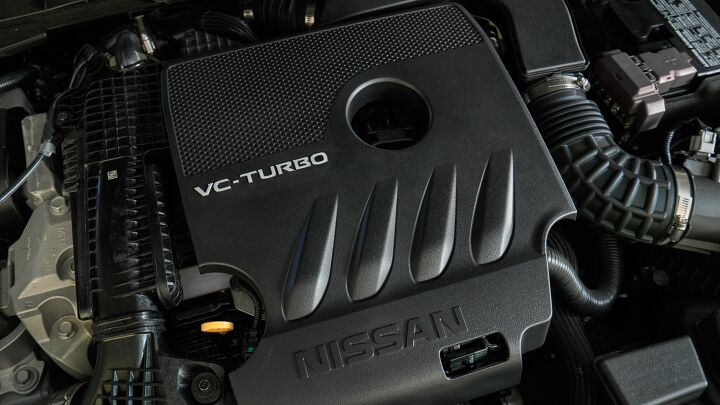The NHTSA is Investigating Nissan's Variable Compression Engine Problems

Nissan hailed its variable compression engines as great for performance and fuel economy, though the real-world benefits of the advanced mills haven’t completely lived up to the hype. They also appear to have issues that could cause a loss of power, knocking sounds, and engine failure in the most extreme cases, leading the National Highway Traffic Safety Administration to open an investigation.
The NHTSA is looking at more than 450,000 Nissan vehicles that use one of its two variable compression engines, including the Altima, Rogue, and Infiniti QX50. Owners have reported all sorts of issues with the 2.0-liter four-cylinder and 1.5-liter three-cylinder engines, but the automaker has not yet issued a recall to address the problems.
Variable compression technology allows the engines to shift their compression ratios to maximize fuel economy or power, depending on the situation. Despite those benefits, Nissan’s engines return only marginally better fuel economy, and the automaker remains the only company using the technology.
Though this is just an investigation at this point, the NHTSA could push for a recall if it determines that there is a defect. The complexity of the engines gives them their notable capabilities, but more complication isn’t always a good thing in mechanical systems. After all, there’s probably a good reason that other automakers haven’t followed Nissan down the variable compression path, and it’s likely because they’re expensive to develop and produce. Their complicated designs could have multiple possible failure points, which is less than desirable for a component that needs to run for tens of thousands of miles.
[Image: Nissan]
Become a TTAC insider. Get the latest news, features, TTAC takes, and everything else that gets to the truth about cars first by subscribing to our newsletter.

Chris grew up in, under, and around cars, but took the long way around to becoming an automotive writer. After a career in technology consulting and a trip through business school, Chris began writing about the automotive industry as a way to reconnect with his passion and get behind the wheel of a new car every week. He focuses on taking complex industry stories and making them digestible by any reader. Just don’t expect him to stay away from high-mileage Porsches.
More by Chris Teague
Latest Car Reviews
Read moreLatest Product Reviews
Read moreRecent Comments
- Namesakeone If I were the parent of a teenage daughter, I would want her in an H1 Hummer. It would be big enough to protect her in a crash, too big for her to afford the fuel (and thus keep her home), big enough to intimidate her in a parallel-parking situation (and thus keep her home), and the transmission tunnel would prevent backseat sex.If I were the parent of a teenage son, I would want him to have, for his first wheeled transportation...a ride-on lawnmower. For obvious reasons.
- ToolGuy If I were a teen under the tutelage of one of the B&B, I think it would make perfect sense to jump straight into one of those "forever cars"... see then I could drive it forever and not have to worry about ever replacing it. This plan seems flawless, doesn't it?
- Rover Sig A short cab pickup truck, F150 or C/K-1500 or Ram, preferably a 6 cyl. These have no room for more than one or two passengers (USAA stats show biggest factor in teenage accidents is a vehicle full of kids) and no back seat (common sense tells you what back seats are used for). In a full-size pickup truck, the inevitable teenage accident is more survivable. Second choice would be an old full-size car, but these have all but disappeared from the used car lots. The "cute small car" is a death trap.
- W Conrad Sure every technology has some environmental impact, but those stuck in fossil fuel land are just not seeing the future of EV's makes sense. Rather than making EV's even better, these automakers are sticking with what they know. It will mean their end.
- Add Lightness A simple to fix, strong, 3 pedal car that has been tenderized on every corner.


































Comments
Join the conversation
"...but more complication isn’t always a good thing in mechanical systems."
"...but more complication is never, ever a good thing in mechanical systems, no exceptions."
FIFY
When I first saw a description of these engines I wondered how Nissan had made such a complex design reliable enough for mass production. Guess it turns out they didn’t. I am surprised the tech didn’t provide more efficiency benefits.